
The IT Infrastructure Library (ITIL) is the most popular framework for managing IT services. In this article, you’ll find the most useful ITIL templates to streamline your understanding of ITIL and help you begin implementing practices today.
ITIL service strategy focuses on defining the services that IT organizations deliver to customers. Below, you will find a service portfolio checklist and financial management analysis to help get started with these ITIL practices.
Understanding the value IT provides to a business is essential. An IT service portfolio is the starting point for understanding what IT does — how IT delivers business value by supplying essential IT services. The services that an IT team offers include IT systems, business services, and professional services.
A service portfolio can be used with or without a service catalog, but if you are going to design one, it’s essential to develop a service portfolio first. An IT service portfolio contains the complete set of services that an IT department manages.

This checklist guides the development of an IT service portfolio, which, in turn, supports the development of a service catalog. The checklist benefits management throughout the organization as well as IT team members by providing visibility into IT’s purpose.
Download ITIL Service Portfolio Checklist
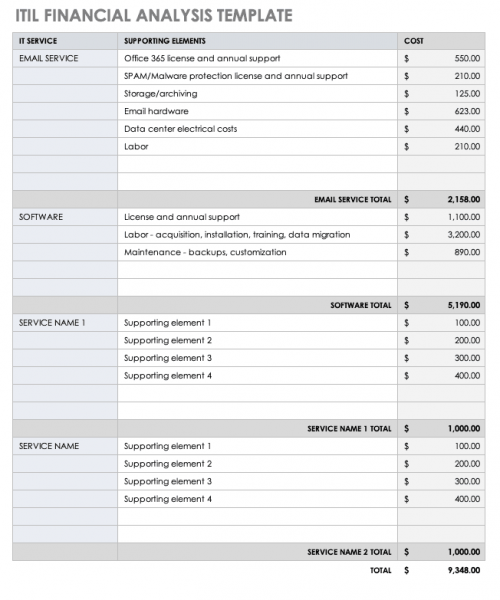
ITIL financial management focuses on managing the value of IT-provided services by considering all associated costs. Accounting, budgeting, and how much to charge for services are all elements of IT financial management.
It is necessary to understand all the supporting services in order to calculate the total cost of the main IT service. Total cost should include capital costs, operational costs, fixed costs, and variable costs. You can use this template as a starting point to help calculate the cost of IT services. Some costs may require estimation and depreciation.
ITIL service design practices focus on coordinating the design of new, existing, and continuously improving IT services. Below, you will find templates to help you get started with service-level agreements (SLAs), operational-level agreements (OLAs), capacity planning, service availability, service continuity, supplier management, and service catalog management.

SLAs and OLAs are developed as part of the ITIL service-level management practice. The goal is to deliver IT services based on the defined service-level targets. This template serves as a guide for the information that is typically included in an IT service-level agreement. You can also use this template to create operational-level agreements and underpinning contracts with third parties.
Download ITIL Service-Level Agreement/Operational-Level Agreement Template

ITIL capacity management ensures the current service and infrastructure capacity can support the delivery of services based on agreed-upon service-level targets. In addition, you can use capacity planning to calculate the additional resources necessary to support future growth. This template provides the information most commonly used when planning for future capacity.
Download ITIL Capacity Planning Template

Service availability focuses on measuring the reliability of IT services. Use this template to easily calculate and report on the percentage of time your IT services are available to customers.
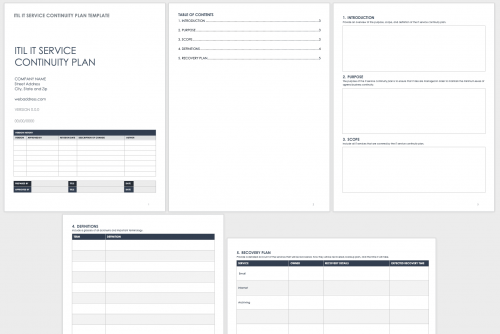
IT service continuity management focuses on how to restore one or more IT services to ensure that a business can continue to operate. The IT service continuity plan is the formal strategy for restoring services in case the continuity of IT services is compromised. Use this template as a starting point for documenting procedures to follow if your business needs to recover critical IT services.
Download ITIL IT Service Continuity Plan Template

The goal of supplier management is to ensure that all suppliers meet contract commitments and support the needs of a business. Use this template to manage all IT service providers and contracts.
Download Supplier Management Template
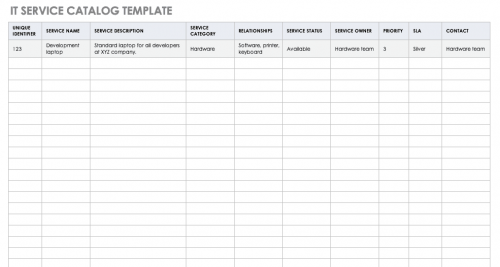
The service catalog is a curated collection of all IT services, including information such as service status and service dependencies. This template aids in creating the list of IT services and the information that proves useful to IT customers and business stakeholders.
The goal of ITIL service transition practices is to ensure that IT service deployment and the changes to those services take place in a smooth, coordinated manner. Below, you will find templates for a change request, service asset and configuration management, release management, and project management.
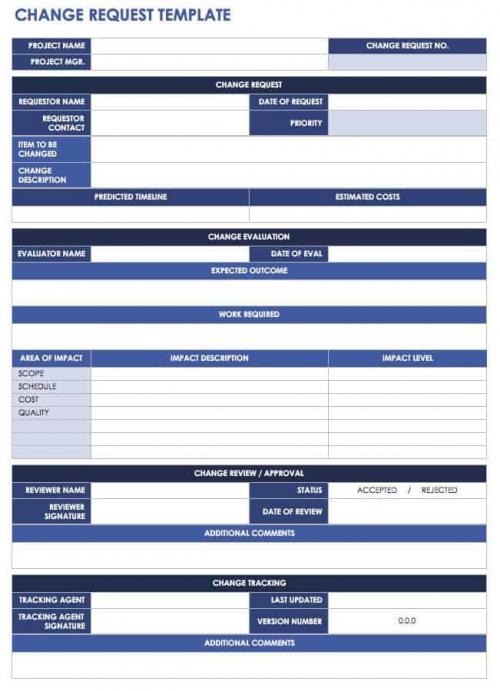
A change request is standard documentation in change management, and may include information on the person requesting the change, the change being requested, evaluation details, and the resolution. You can use this form to initiate a change control process and document the lifecycle of change requests and the request fulfillment process. You can modify this change request template to include the details needed for your specific change process.

The goal of service asset and configuration management is to plan and manage assets and configuration items that a business uses across all its departments. This template helps to capture the configuration item details essential to supporting ITIL practices. You can use these details to populate the configuration management database (CMDB) or configuration management system (CMS).
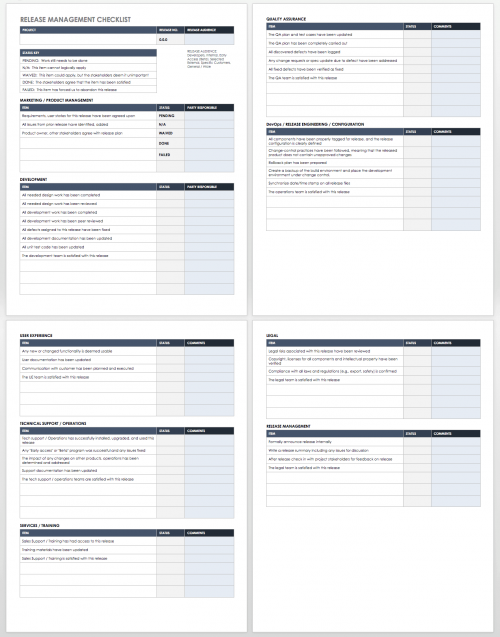
The goal of ITIL release and deployment management is to manage the planning, scheduling, building, testing, and deployment of releases with minimal impact to existing IT services. Use this template to manage a simple release.
Download IT Release Management Template

ITIL project management is focused on coordinating service transition practices in order to avoid or resolve conflicts. This template will help you plan, track, and visualize your project with an interactive timeline.
Download Agile Project with Gantt Template
ITIL service operation practices focus on the day-to-day tasks and practices that take place to deliver IT services to business customers. In this section, you will find incident management, problem management, and event management templates.

The ITIL incident record template guides you through the data most commonly collected when an IT incident occurs, including SLA breach, IT service impacted, and major incident indicator.
Download ITIL Incident Record Template

This template is intended to guide incident management practice owners and stakeholders through a major incident postmortem review.
Download ITIL Major Incident Review Template

The ITIL problem record template guides you through the data most commonly collected when an IT problem occurs, including root cause, associated incidents, and corrective actions.
Problem management focuses on identifying problems quickly, providing end-to-end management, and diagnosing the underlying root cause in order to prevent problems from reoccurring. Root cause analysis is the analysis or systematic investigation you perform to identify the fundamental cause of a problem.
There are various techniques you can use to perform root cause analysis. Depending on the problem, you can use techniques on an individual basis or in conjunction with one another. Here are some of the techniques professionals use to perform root cause analysis:
Use this simple root cause analysis template to examine and analyze the root cause of IT problems.

Download Root Cause Analysis Template
You can find templates for several of the above mentioned approaches here and here, as well as additional decision making techniques.

ITIL event management detects events that occur across a business’ IT infrastructure. Of the many events that can arise, some may be problematic, while others are simply part of normal operations. The goal of event management is to analyze events to determine if any action should be taken. Use the event management record template to help you ascertain which data you should collect for each event.

The goal of ITIL continual service improvement (CSI) is to analyze data, such as critical success factors and key performance indicators, in order to detect opportunities for improvement across all IT practices and services. Use this gap analysis template to review services and practices, identify where they fall short, and plan for how to improve or update them.
This template includes an area to describe the practice or service, note the owner, and state the current and desired results. Use action items and target date areas to start developing a plan to make improvements. Doing this helps create a service/practice improvement plan.
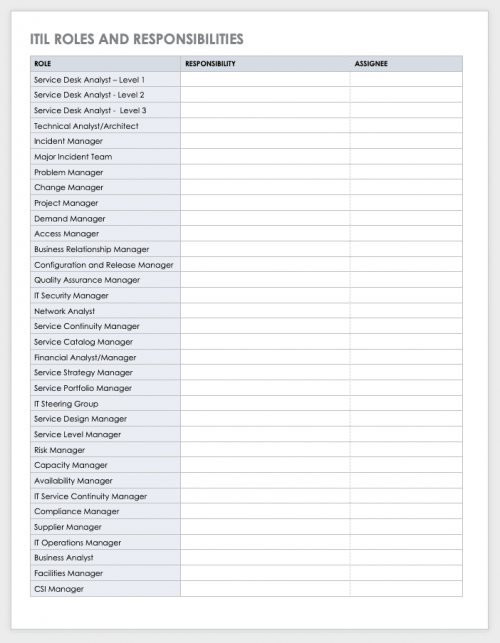
The organization of people is an important part of the ITIL framework. Within an organization, you must define roles and teams in order to manage practices and ensure quality service delivery. It is not uncommon for one person to wear multiple hats.
For example, an incident manager may also be the problem manager. However, no matter how many staff members you have and how many hats they wear, it’s necessary to clearly define who is responsible for the practices and associated tasks.
You can use the following template to indicate roles and associated responsibilities. To get you started, the template includes Common IT and ITIL roles.
Download ITIL Roles and Responsibilities Template

A business case helps stakeholders understand what it is that you want to do and how it benefits the business. Use this template to present a clear and comprehensive business plan for your ITIL initiative or development or change to an IT service.
Download Business Case Template

An implementation plan can support and guide any major initiative. ITIL practice implementation requires careful thought, so you can accurately consider the level of dependency on people, process, and technology. This implementation plan provides a standard, but scalable guide to organizing actions, prioritizing, assigning ownership, and tracking progress.
Download ITIL Implementation Plan Template

Documentation is a key element of defining and implementing ITIL practices. This template helps you gather practice purpose, flow, and roles and responsibilities. It also includes a visual flow chart for practice mapping. Customize the template by editing or adding sections based on your specific ITIL practices.
Download Practice Document Template
ITIL provides best practices for delivering IT services to your business, but for many IT practitioners, this framework can be overwhelming. ITIL is not prescriptive, but rather allows organizations to flexibly apply practices based on their unique business needs. ITIL templates make it easier to get started with the framework by providing visual, tangible documents to work with.
Templates can act as a reference guide for ITIL practices by doing the following:
We will discuss ITIL in more detail below.
ITIL dates back to the 1980s, when the British government launched an initiative to improve the quality of IT services delivered to government agencies. The goal was to create a high-quality, cost-effective IT service delivery framework. Over the years, this framework has gone through various naming conventions, experienced changes in agency ownership, and enjoyed adoption growth across both government and non-government sectors.
Today, Axelos is the U.K. government organization charged with managing all frameworks and methodologies. The most recent ITIL update, ITIL 4, came out in early 2019, and incorporates the most modern trends in IT operations, such as Agile, DevOps, and Lean.
ITIL 4, renames “ITIL processes” as “ITIL practices” and organizes these 34 practices across three categories: general management practices, service management practices, and technical management practices. The table below categorizes the 34 practices.
General Management Practices
Service Management Practices
Technical Management Practices
Continual Service Improvement
Infrastructure and Platform Management
Information Security Management
Capacity and Performance Management
Software Development and Management
Measurement and Reporting
Organizational Change Management
IT Asset Management
Monitoring and Event Management
Service Catalog Management
Service Financial Management
Service Configuration Management
Service Continuity Management
Workforce and Talent Management
Service Request Management
Service Validation and Testing
Thousands of organizations around the world have adopted ITIL, and the framework continues to expand. ITIL’s unique terminology and number of practices may feel overwhelming, but templates can help you collect necessary details and plan for a successful implementation. With the range of concise, easy, and practical templates, plans, and checklists included in this article, you’ll be equipped to write a solid service-level agreement, define the contents of a problem, incident, and event record, establish rules, improve practices using a gap analysis, and much more.
Empower your people to go above and beyond with a flexible platform designed to match the needs of your team — and adapt as those needs change.
The Smartsheet platform makes it easy to plan, capture, manage, and report on work from anywhere, helping your team be more effective and get more done. Report on key metrics and get real-time visibility into work as it happens with roll-up reports, dashboards, and automated workflows built to keep your team connected and informed.
When teams have clarity into the work getting done, there’s no telling how much more they can accomplish in the same amount of time. Try Smartsheet for free, today.